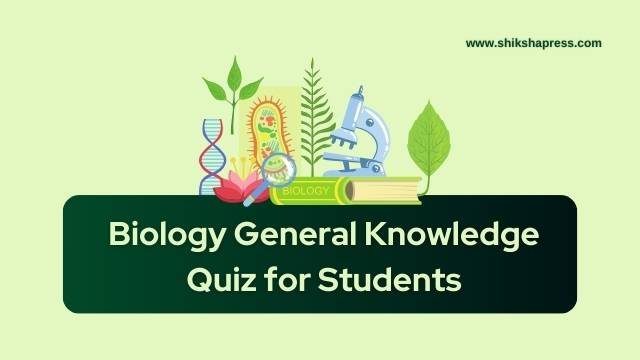GK MCQs Quiz on Biology for Students
Welcome to Shiksha Press for our fun and exciting biology GK quiz! If you’re exited to learn more about the amazing world of biology by a GK Quiz for Biology then, you’re in the right place.
These GK questions Biology Quiz is packed with interesting MCQs GK questions related to biology that will test your knowledge about Biology and spark your curiosity to know more about it.
From plants and animals to human bodies and ecosystems, get ready to answer general knowledge questions biology style. Our biology general knowledge questions and answers are designed to make learning fun and accessible.
So, whether you’re studying for a test or just want to challenge yourself, dive into our biology GK questions and see how much you know.
Let’s explore and solve the wonders and discoveries of biology together with our engaging biology general knowledge quiz!
Take Part in Fun and Engaging Biology General Knowledge Quiz
Click the Correct Answers from Gk Biology Questions
#1. Which blood cells are responsible for fighting infections?
#2. What is the powerhouse of the cell?
#3. What type of organisms produce methane?
#4. Which is NOT a characteristic of all living organisms?
#5. Which organ system is primarily responsible for transporting nutrients, gases, and wastes in the body?
#6. What is the process by which plants make their own food?
#7. What is the study of fungi called?
#8. Which organ is responsible for filtering and detoxifying the blood?
#9. Which of the following is not a macromolecule?
#10. Which of the following is NOT a type of passive transport?
#11. Which part of the human body is affected by leukemia?
#12. What is the term for a group of similar cells performing the same function?
#13. What is the term used to describe the loss of water from the surface of plant leaves?
#14. In which part of the plant does photosynthesis primarily occur?
#15. Which hormone regulates blood sugar levels?
#16. Which vitamin is produced in the skin under sunlight?
#17. What type of organism is a mushroom?
#18. What does DNA stand for?
#19. What are the building blocks of proteins?
#20. What is the smallest unit of life?
Results
Biology General Knowledge Questions and Answers
Here are some more interesting Biology GK Questions and Answers for Students.
What is considered the basic unit of life and is the smallest structure capable of performing all the processes necessary for life?
The cell is recognised as the basic unit of life. It is the smallest structure capable of performing all vital life processes, including growth, metabolism, response to stimuli, and reproduction.
Which human body organ is primarily responsible for the filtration and removal of waste products from the blood?
The kidneys are responsible for filtering and removing waste products from the blood. They also play crucial roles in maintaining electrolyte balance, regulating blood pressure, and producing urine.
Describe the process used by plants to convert solar energy into chemical energy.
Photosynthesis is the process by which plants convert solar energy into chemical energy. In this process, plants absorb sunlight using chlorophyll in their leaves and convert carbon dioxide and water into glucose (a sugar) and oxygen. This process is essential for plant growth and provides energy for other organisms that eat plants.
What molecule is known for carrying genetic information in living organisms, and what are its components?
DNA, or Deoxyribonucleic acid, carries genetic information in living organisms. It is composed of two long strands that form a double helix, consisting of nucleotides, which include a sugar group, a phosphate group, and one of four types of nitrogen bases: adenine, thymine, cytosine, or guanine.
Explain the structure and function of the human heart, focusing on its chambers.
The human heart has four chambers: two atria (upper chambers) and two ventricles (lower chambers). The right atrium receives deoxygenated blood from the body and pumps it into the right ventricle, which then sends it to the lungs for oxygenation. The left atrium receives oxygenated blood from the lungs and pumps it into the left ventricle, which then distributes it throughout the body. This four-chamber system helps to efficiently circulate blood and maintain the separation of oxygenated and deoxygenated blood.
What is mycology, and what does it study?
Mycology is the branch of biology that studies fungi, including their genetic and biochemical properties, their taxonomy, and their use to humans as a source for medicine and food, as well as their dangers, such as toxicity or infection.
We hope you liked this GK biology Quiz. Learn and Solve more like this:
GK Quiz: Answer These Questions to Prove your Genius
For the Latest Educational News (CBSE, ICSE, and State Board News) and live news updates, like us on Facebook or follow us on Twitter and Join our Premium Telegram Channel. Read more on Latest Exams & Results News on Shikshapress.com.





